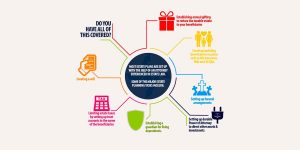You spend your life earning assets and creating an inheritance for your children and family. The best way you can keep it safe for them is to practice estate planning. You must take the first step to draft a will. You must remember that a will is subjected to probate via the court. The Will is your final testament and the document that takes into account what you want to leave to whom. Your beneficiaries can access your wealth once the probate is granted.
How Does Probate Work As A Part Of Estate Planning
You have a large estate and are using multiple tools to strategize a smooth take over by your legal heirs. A Will is an integral part of your repertoire. Your estate planning lawyer will help you draft a will that lists all your movable and fixed assets. You can use the will as an instrument to do the valuation of the estate, pay off taxes and distribute the reminder amongst the beneficiaries.
The probate is also a process that is used to pay your last bills and inheritance tax before the assets are distributed to your heirs if you die intestate. The process remains the same, although the laws may be a little different for each state.
Probate Is The Authenticating Process Of Your Will
Your legal heirs should file for probate after your death to be able to access the estate you leave behind. You need the will to move the probate court. You may need to file a valid death certificate and other necessary documents to start the process. The state provides forms to help you with the process.
The court verifies that the Will is valid. A hearing will then be scheduled and all the beneficiaries will and all legal heirs are given due notice. If any person has any objections to the will, they can come forward to raise their objections. This situation can arise if the will is not drafted well or a legal heir has a more recent version of the will. Anyone of the heirs may also object to the choice of an executor to process the will.
You may choose to sign a declaration or affidavit along with the requisite witnesses when you are drafting the will. If you have failed to do this, any one of the witnesses on the will may be asked to testify regarding the authenticity of the Will.
The Executor And Estate Planning
You may appoint an executor for the Will when you draft it or the court may appoint one in the absence of the will. The executor of the will is responsible for overseeing the court’s process. The letter of authority is granted to the executor to be able to carry out his obligations.
The executor has to post a bond in preparation to assume duties to act for the estate. The bond can vary from state to state.
The executor has to first locate and take possession of the estate assets. The job is to protect them while the probate is on-going. This process can be long and protracted. Many a time if the will is not updated, or there is no will, there might be a property that remains hidden from the family. This may be an issue that the executor has to solve.
Probate Is Not The Villain While Estate Planning
It is a long-standing legal myth that probate eats away a big part of the estate. It is true that the process is long and does involve legal costs, but most states have made reforms. The process has become simpler and less tedious. Most states today have provisions that part of the estate is cleared to pass on to your family immediately. This allows them to live comfortably while waiting for the probate to go through. As a result, taxes have been reduced too.
Although the Probate is not private, it is only the celebrities who fear the public eye. The will and hence probate is still the best way to pass on your assets to your beneficiaries. It never makes sense to go by the ‘do it yourself’ hacks that tout a ‘one size fits all’ estate plan. Every person has a different need and a different attitude towards estate planning. It is always prudent to engage a professional who can help you plan and execute the best strategy. So, you will also need to review the plan periodically to incorporate the changes in laws and the nature of your estate.



